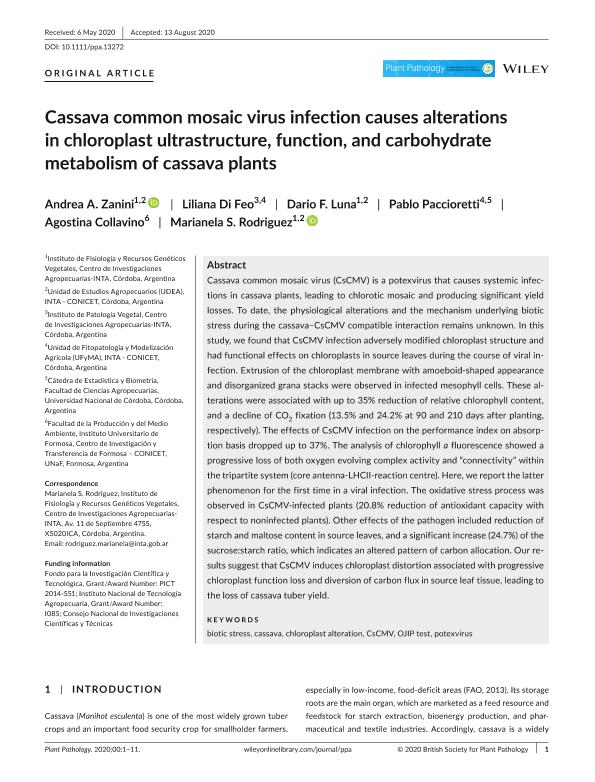Artículo
Cassava common mosaic virus infection causes alterations in chloroplast ultrastructure, function, and carbohydrate metabolism of cassava plants
Zanini, Andrea Alejandra ; Di Feo, Liliana del Valle
; Di Feo, Liliana del Valle ; Luna, Dario Fernando; Paccioretti, Pablo Ariel
; Luna, Dario Fernando; Paccioretti, Pablo Ariel ; Collavino, Agostina Antonella
; Collavino, Agostina Antonella ; Rodriguez, Marianela Soledad
; Rodriguez, Marianela Soledad
 ; Di Feo, Liliana del Valle
; Di Feo, Liliana del Valle ; Luna, Dario Fernando; Paccioretti, Pablo Ariel
; Luna, Dario Fernando; Paccioretti, Pablo Ariel ; Collavino, Agostina Antonella
; Collavino, Agostina Antonella ; Rodriguez, Marianela Soledad
; Rodriguez, Marianela Soledad
Fecha de publicación:
01/2021
Editorial:
Wiley Blackwell Publishing, Inc
Revista:
Plant Pathology
ISSN:
0032-0862
Idioma:
Inglés
Tipo de recurso:
Artículo publicado
Clasificación temática:
Resumen
Cassava common mosaic virus (CsCMV) is a potexvirus that causes systemic infections in cassava plants, leading to chlorotic mosaic and producing significant yield losses. To date, the physiological alterations and the mechanism underlying biotic stress during the cassava–CsCMV compatible interaction remains unknown. In this study, we found that CsCMV infection adversely modified chloroplast structure and had functional effects on chloroplasts in source leaves during the course of viral infection. Extrusion of the chloroplast membrane with amoeboid-shaped appearance and disorganized grana stacks were observed in infected mesophyll cells. These alterations were associated with up to 35% reduction of relative chlorophyll content, and a decline of CO2 fixation (13.5% and 24.2% at 90 and 210 days after planting, respectively). The effects of CsCMV infection on the performance index on absorption basis dropped up to 37%. The analysis of chlorophyll a fluorescence showed a progressive loss of both oxygen evolving complex activity and “connectivity” within the tripartite system (core antenna-LHCII-reaction centre). Here, we report the latter phenomenon for the first time in a viral infection. The oxidative stress process was observed in CsCMV-infected plants (20.8% reduction of antioxidant capacity with respect to noninfected plants). Other effects of the pathogen included reduction of starch and maltose content in source leaves, and a significant increase (24.7%) of the sucrose:starch ratio, which indicates an altered pattern of carbon allocation. Our results suggest that CsCMV induces chloroplast distortion associated with progressive chloroplast function loss and diversion of carbon flux in source leaf tissue, leading to the loss of cassava tuber yield.
Palabras clave:
BIOTIC STRESS
,
CASSAVA
,
CHLOROPLAST ALTERATION
,
CSCMV
,
OJIP TEST
,
POTEXVIRUS
Archivos asociados
Licencia
Identificadores
Colecciones
Articulos (UDEA)
Articulos de UNIDAD DE ESTUDIOS AGROPECUARIOS
Articulos de UNIDAD DE ESTUDIOS AGROPECUARIOS
Articulos(CCT - CORDOBA)
Articulos de CTRO.CIENTIFICO TECNOL.CONICET - CORDOBA
Articulos de CTRO.CIENTIFICO TECNOL.CONICET - CORDOBA
Citación
Zanini, Andrea Alejandra; Di Feo, Liliana del Valle; Luna, Dario Fernando; Paccioretti, Pablo Ariel; Collavino, Agostina Antonella; et al.; Cassava common mosaic virus infection causes alterations in chloroplast ultrastructure, function, and carbohydrate metabolism of cassava plants; Wiley Blackwell Publishing, Inc; Plant Pathology; 70; 1; 1-2021; 195-205
Compartir
Altmétricas



